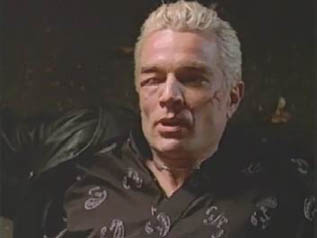
Thanks to screencaps.foolforlove.net
for
the screeencap
By Liz
REDEMPTIONThis season of BTVS is not about Spike's redemption. Last season was, certainly. In season five, we watched Spike's progression from doing good, grudgingly, to being good, sometimes. His motive force was love: uninvited, chivalrous, unrequited, romantic in the truest sense.
Season six isn't about that anymore. Spike reached a place in "The Gift," and carried on into "Bargaining" and "Afterlife," that is good enough for now. Season six is about how Buffy deals with it.
As such, despite major Spike screen time, this season has been redemption-neutral. Oh, the redemption meter has fluctuated up and down occasionally, in parallel or in opposition to Buffy's struggles, but the average redemption level has been quite constant. And pretty good for an evil, soulless fiend.
"Dead Things" presented the pull-and-push of Spike's redemption starkly in two scenes. The first is the infamous Bronze sex scene, where Spike draws Buffy away from her friends, into the shadows. This is classic evil tempter behavior - what you really need, honey, is a bite from this apple - and it doesn't matter if Buffy wants it, if it's just a sex game, or if he believes it. No one knows better than Spike that Buffy's strength comes from her friends. No one knows more personally than Spike that drawing her away from her friends is a Bad Thing.
For Spike, this is a fall from grace, a fall impelled by Buffy. She insists that Spike is disjoint from her world - he is not a part of her real life. For her, he will play the role of the outsider, in spite of his social nature, and he will try to bring her along. In doing so, his love for Buffy becomes the instrument of his fall.
Not for long, however. True love is ultimately redemptive, and in the alley, Spike reverts to form. As he's proved so often, he will do anything to save Buffy: This time it's hide a body, block her path, argue, beg. His motives are those of love, both selfish - he can't go on without her - and selfless - Buffy is too good, too important to suffer for this accident. Notably, however, his motives are not evil. He doesn't encourage Buffy to do wrong; he simply tries to convince her to do what he sees as right. In the end, he offers up himself. "Put it all on me," he says, and she does. Like so many of Spike's plans, it does not work. Once again he ends up lying broken and bloody, watching Buffy give herself up.
But in another sense, it works perfectly. It reveals. It reveals that the Spike of "Intervention" and "The Gift" remains - not pulling Buffy into darkness, but cherishing her light. And it reveals a flaw in Buffy that she does not yet perceive. Her flaw is a kind of moral blindness; she sees only absolutes. Vampires are evil. But the real world is full of ambiguity, and growing up means finding a way to deal with the shades of gray.
This, then, is the story of season six. Spike's redemptive status - definitely ambiguous - aggravates it, responds to it, pulls and pushes it. So while season six isn't about Spike's redemption, his redemption is vital to what the season is about. As such, we probably won't see his redemptive status change much. If Spike becomes too bad or too good, Buffy's choice becomes simple again. For Buffy to truly grow up, she must find a way to fit a conditionally good vampire into her world and to resolve the intriguing questions he raises.
RELATIONSHIP
Anyone who still thinks Spike is just in it for the sex now has another think coming.
In the opening scene of "Dead Things," Spike and Buffy, awash in the afterglow, actually <drumroll, please> converse. It's sweet, silly, flirty, normal, and Spike *loves* it. We've never seen him smile, even laugh, with such genuine pleasure before.
Oh, yeah, he puts his foot in it soon enough, and it's back to the role-playing, but not before we've learned his secret: He likes her.
He loves her, too, and demonstrates it bigtime as he tries to shield her from the repercussions of her accident. He will do anything, he will die at her hands, to save her. If it were up to Spike, the ship would be sailing on the open seas.
But Buffy's steering this ship, and "Dead Things" finally examines the fundamental questions about her feelings for Spike. Does she like him? Sometimes. Does she trust him? With handcuffs, dead bodies, her life. But it's in the closing scene that Buffy at last considers the real question. Does she love him? Her answer: Impossible; it's wrong to love an evil, soulless fiend. But the alternative is equally abhorrent. If she doesn't love him, then she's just using him. She's finally reached the crux. There are no excuses left. She came back right, but she's doing something she believes to be absolutely wrong. Does she love him? Yup. And hates it almost enough to kill him for it.
Unless Buffy finds a way to love Spike without hating herself, there can be no real relationship. It's too bad, because as allies, they've always brought out the best in each other. And during their brief flashes of friendship, they make each other smile.
If the ship's the thing, then Buffy is right. "We don't have a `thing,' we just have...this." What this will become is anyone's guess.